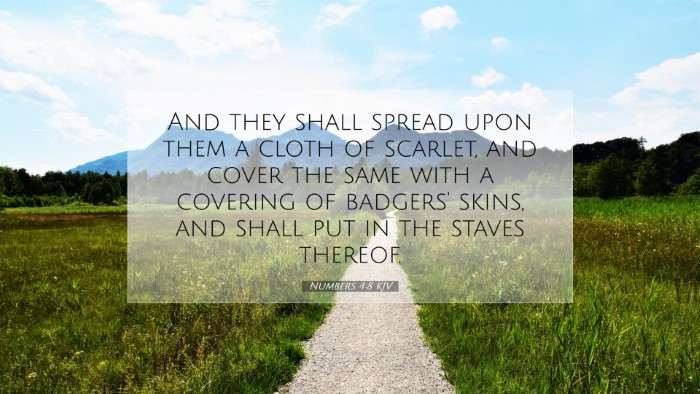Commentary on Numbers 4:8
Verse Context: Numbers 4:8 states, "And they shall spread upon them a cloth of scarlet, and cover the same with a covering of badgers' skins, and shall put in the staves thereof." This instruction is part of the guidelines given to the Levites regarding the transport and care of the sacred items within the Tabernacle.
Introduction
In examining Numbers 4:8, we delve into the intricate regulations governing the worship and service in the Israelite community. Understanding these instructions is pivotal for grasping the holiness of God's presence and the importance of reverence in worship. The commentaries from Matthew Henry, Albert Barnes, and Adam Clarke provide rich insights into the theological and practical implications of this passage.
Historical Context
The Book of Numbers details the journey of the Israelites from Mount Sinai to the Promised Land. It emphasizes God's presence among His people and His specific instructions for worship. In this chapter, God commands the Levites, particularly the sons of Kohath, to manage the sacred furnishings of the Tabernacle. Each detail reflects a broader theological significance, symbolizing obedience, respect, and divine ordination.
Analysis of Key Elements
1. The Cloth of Scarlet
Symbolism of Color: Scarlet is often associated with sacrifice and atonement in Scripture. In the context of the Tabernacle, it signifies the blood of sacrifices and the cost of redemption. Matthew Henry observes that the scarlet cloth serves as a reminder of the sacredness of the utensils it covers, underscoring the seriousness of handling holy items with the utmost care.
2. Covering with Badgers' Skins
Protection and Purity: The covering with badgers' skins (or sea cow hides, as some translations suggest) is significant in its practicality. Albert Barnes notes that such coverings provided protection against the elements, thereby preserving the items' sanctity. This act can be seen as a metaphor for the need to keep sacred things from external corruption and pollution.
3. The Staves
Mobility and Service: The staves (or poles) attached to the sacred items allowed for transportation. Adam Clarke emphasizes that mobility is essential to the ministry of the Levites. These staves symbolize the active service of God's people in moving and fulfilling His commandments. They reflect the concept of being ready for service at all times, which is central to the life of a believer.
Theological Implications
1. Holiness and Reverence
The meticulous nature of these instructions reflects the holiness of God. The church today must grasp the importance of reverence in worship. As Matthew Henry emphasizes, handling sacred things demands a respectful attitude, acknowledging the danger of approaching God casually.
2. Preparation for Service
Numbers 4:8, in its context, speaks to the idea of being prepared for service. Albert Barnes points out that God's people must be equipped and ready. The preparation of the sacred items was not merely for transport but facilitated service to God. This preparedness extends to the hearts and lives of believers today, who are called to be instruments of God's will.
3. Symbolism of Covering
The covering of the items can be seen as symbolic of Christ's atonement, which shields believers from judgment. Adam Clarke poignantly illustrates this analogy, showing how Jesus covers our sin and grants us access to God's presence. The Tabernacle elements, in their covering, reflect the ultimate covering offered through Christ's sacrifice.
Practical Applications for Today's Believers
- Understanding Holiness: Believers should approach worship and service with a clear understanding of God's holiness. Awareness of this can transform individual worship and communal gatherings.
- Being Prepared: Much like the Levites, today's Christians are called to be prepared and equipped for service. Regularly assessing one's readiness to serve God's purposes is crucial.
- Valuing Sacred Duties: Routine aspects of ministry should not be treated lightly. Recognizing the significance of the tasks we undertake is vital for spiritual health and productivity.
Conclusion
Numbers 4:8 serves as a poignant reminder of the reverence required in handling what is holy. Insights from prominent theologians enrich our understanding of this passage, allowing us to grasp its implications for worship and service today. The instructions provided not only highlight God's desire for order and respect but also point to deeper truths about the nature of service, preparation, and holiness.


